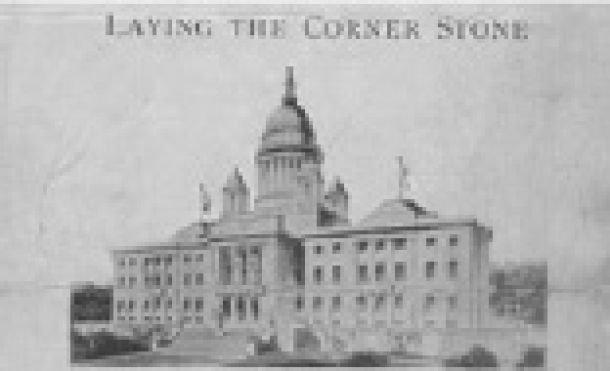An eccentric but extraordinary Brother
Lorenzo Dow, who has been called an eccentric but extraordinary man, was a devoted Christian and a consistent Mason. He was made a Mason in St. Alban's Lodge on Christmas Day 1824 ...
... and on the following day received his Fellow Craft and Master Mason degrees. Masonic legend relates that the lodge was called in the afternoon at the conclusion of the service at the church at which Brother Dow was preaching. Certain of his parishioners, learning of his intentions, tried to dissuade him from his purpose, some of them going so far as to accompany him to the door of the lodge room. He refused to listen to their entreaties, however, and upon arriving at the entrance to the lodge he paused, surveyed his followers for a moment and then with the words "Wither I go ye cannot follow," disappearing from their sight.
 Brother Dow was a strong temperance advocate and no doubt it was through his influence that the lodge in its early history took a decided stand against the use of ardent spirits and we find the following vote recorded: "That we as a body of Free and Accepted Masons will dispense with the use or ardent spirits on festival occasions." This was a period when there were five distilleries in Bristol, some of them making 200 gallons of rum per day and the cause of prohibition had not advanced to its present popularity (circa 1920).
Brother Dow was a strong temperance advocate and no doubt it was through his influence that the lodge in its early history took a decided stand against the use of ardent spirits and we find the following vote recorded: "That we as a body of Free and Accepted Masons will dispense with the use or ardent spirits on festival occasions." This was a period when there were five distilleries in Bristol, some of them making 200 gallons of rum per day and the cause of prohibition had not advanced to its present popularity (circa 1920).
A more complete account of Dow's life and Masonic affiliations is reprinted from an article written by Brother James R. Chase in 'Masonic Americana' in 1974. (Editor)
By: R∴W∴Richard Lynch, Editor
"Crazy Dow"- Crusader
Freedom, fervency, and zeal characterized Lorenzo Dow's 40 years of peripatetic preaching. Born in Connecticut in 1777, he was brought up frugally and educated in religion and common learning. At the age of eighteen years, an asthmatic skinny youth, he became a probationary Methodist circuit rider and preacher, but his idiosyncrasies discouraged unreserved acceptance by the church authorities. So, he went his own way and, while he later was approved to an extent, he was always at odds with the establishment, while apparently accepting Methodist doctrine.
In appearance he is said to have been long and lanky like a bean pole, homely as a hedge fence, wearing misfit clothing which gave him an outlandish appearance. His face was pock-marked: his hair hung in ringlets about his shoulders; his beard was long, luxurious, and unkempt. His dress and mannerisms were those of an eccentric and he was commonly spoken of as "Crazy Dow."
 In a rasping voice he preached hell, fire, and brimstone, was against "atheism, deism, Calvinism and universalism," and promised heaven to those who repented. Such was the power of his personality and the persuasiveness of his evangelistic preaching that he was a great attraction among the impressionable, especially on the frontier, a forerunner of Moody, Billy Sunday, and other revivalists.
In a rasping voice he preached hell, fire, and brimstone, was against "atheism, deism, Calvinism and universalism," and promised heaven to those who repented. Such was the power of his personality and the persuasiveness of his evangelistic preaching that he was a great attraction among the impressionable, especially on the frontier, a forerunner of Moody, Billy Sunday, and other revivalists.
His wanderlust took him all over the United States, from Canada to the Gulf, and westward to the Mississippi. He traveled thousands of miles on foot and on horseback, pausing to preach at every opportunity. He also made three trips to Ireland, England, and Scotland turbulent tours not altogether unproductive of converts for he is credited with foundation of the Primitive Methodists in the British Isles.
When he married it was with the express understanding that family ties were not to be a hindrance to his coming and going on missionary trips. To show his independence (and self-discipline) he left home the day of his wedding. He scheduled his appearances well in advance and seldom failed to meet his engagements or to be home for spring planting on the appointed date. His faithful wife Peggy frequently accompanied him while she lived but when she died the spirit moved him to remarry within three months.
This he did following an announcement of his availability at a camp meeting. He got hooked by a domineering spirit in the person of his volunteer second wife, so much so he once hung a sign on the gate post which read "Women rule here." He settled down to a quitter life on the farm and in his grist mill and spent much time in writing pamphlets and revising his several books which would not be considered best sellers today but brought him good income. He bottled and sold a purgative tonic "Lorenzo Dow's Family Remedy," went to law with his neighbors over boundaries and water rights and ventured less and less into the outside sinful world.
While in Rhode Island in 1824 he had a dream in which he was made a Mason. Resolved to learn the difference between dream and reality, he applied to St. Alban's Lodge No. 6 in Bristol and was initiated on Christmas day. He was to be passed and raised on the next day which was Sunday. After church, some of the congregation, learning where he was going, protested, and followed him to the Lodge Hall. At the door he turned and dismissed them with the words: "Depart! Wither I go, ye cannot follow!" He preached again that night.
As a minister he, of course, paid no fees and suited his convenience in advancing. Thus, he was Arched in Washington Chapter No. 3 Portsmouth, New Hampshire February 25, 1825. While in Vincennes, Indiana, for an extended stay, he was elected High Priest of the Chapter (7) there. He became a Knight Templar in Lebanon Commandery No. 2 at Lebanon, Ohio, March 5, 1827. He joined a Council of Royal and Select Masters but in just what locality has not been ascertained. While in New Orleans be became S.P.R.S. in the Consistory under Charleston authority. During the anti-Masonic excitement, he stood fast for the fraternity with Sovereign Grand Commander Moses Holbrook writing that "Lorenzo Dow is not likely to turn traitor" as many did.
Lorenzo was a staunch democrat or rather a "Jackson man" and when President Andrew Jackson visited Connecticut in 1833 the itinerary took him not far from the Dow home. The popular Tennessean turned off to greet Brother Dow and a couple of hundred of the neighbors gathered at "Hickory Plain" where the flag flew from a hickory flagpole. With this recognition and with little encouragement Lorenzo became somewhat elevated and was moved to ornate. He sputtered, fulminated and exploded against the Whigs, the anti-Masons, the Catholics and even the Methodists, lauding "Old Hickory" for his lonely virtues.
Early the next year he felt impelled to go to Washington to warn the President against the plots and plans of political enemies, whether fancied or real cannot now be determined. He was a visitor in the Georgetown home of George W. Haller, a Past Master of Potomac Lodge No. 5 when he was stricken with a seizure which proved fatal, his death taking place February 2. His dying request was that he might be buried in his great coat, a close companion which had protected him in his stormy travels, and in which he was wrapped for his last journey to that undiscovered country from which he would never return.
Lorenzo Dow had written his own epitaph in these words - "A Christian is the highest style of man. He is a slave to no sect, takes no private road, but looks through nature to nature's God." Brother Dow traveled to the celestial lodge February 2, 1834.
By: Bro. James R. Case


